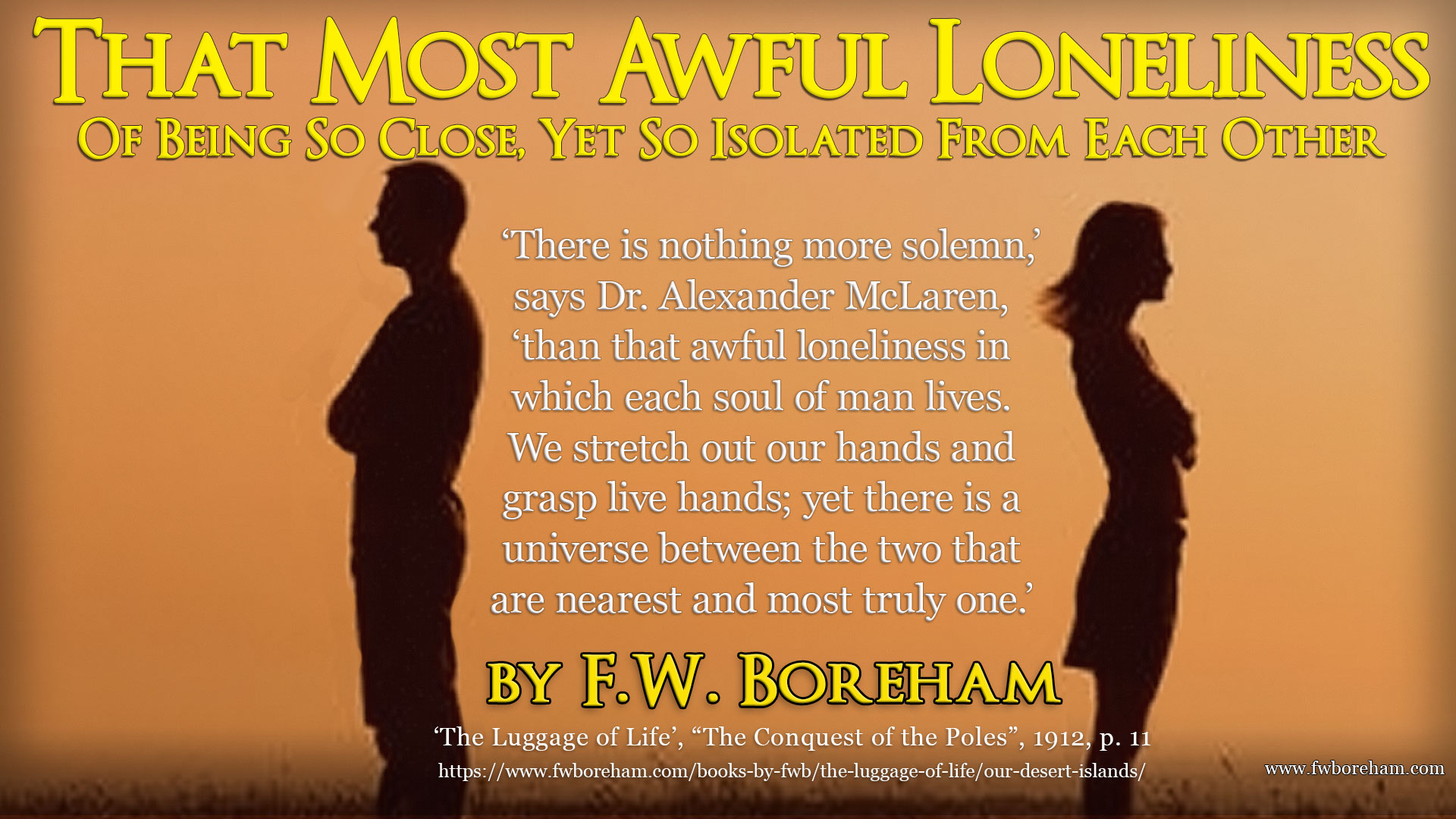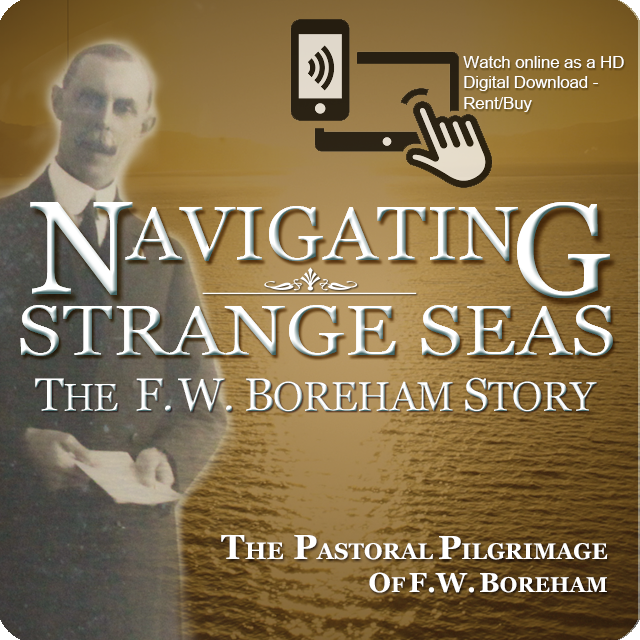home > books by FWB > THE LUGGAGE OF LIFE > 1.2 Our Desert Islands
II
OUR DESERT ISLANDS
IN childhood’s golden hours we all of us squandered a vast amount of sympathy upon Robinson Crusoe. And in later years we have caught ourselves shedding a silent tear for the sorrows of poor Enoch Arden, imprisoned on his ‘beauteous, hateful isle.’ In imagination, too, we have paced with the beloved disciple the rugged hills of Patmos. We have even felt a sympathetic pang for Napoleon in his cheerless exile at St. Helena. And all the while we have clean forgotten that we ourselves are each of us cast upon lonely, sea-girt islands. We are each one of us hopelessly cut off, isolated and insulated. Moreover, unlike the heroes of Defoe and Tennyson, we shall never sight a sail. Our beacon-fires will never bring down any passing vessel to our relief. It is for ever. At our very birth we were chained, naked, like Andromeda, to our rock in mid-ocean; and no Perseus will ever appear to pity and deliver us. The links of the chain by which we are bound are many and mighty. At one or two of them it may do us good to look more particularly.
And by far the mightiest of these insulating factors is the mystery of our own individuality. Each several ego is dreadfully alone in the universe. Each separate T is without counterpart in all eternity. In the deepest sense we are each father-less and childless; we have no kith or kin. When God makes a man He breaks the mould. Heaven builds no sister-ships. We may establish relationships of friendship and brotherhood with other island dwellers across the intervening seas. We may hear their voices shouted across the foam, and read and return their signals; but that is all. The most intense sympathy can never bridge the gulf. No man can enter into the soul of his brother man. ‘I was in the isle,’ says John. And he says it for us all. ‘In all the chief matters of life’ says Amiel in his Journal, ‘we are alone: we dream alone; we suffer alone; we die alone.’ ‘We are all islands,’ says George Eliot in one of her beautiful letters to Mrs. Bray; ‘each in his hidden sphere of joy or woe, our hermit spirits dwell and roam apart.’
‘There is nothing more solemn,’ says Dr. Alexander McLaren, ‘than that awful loneliness in which each soul of man lives. We stretch out our hands and grasp live hands; yet there is a universe between the two that are nearest and most truly one.’ And perhaps Matthew Arnold has said the last word when he sings:
Yes, in the sea of life enisled,
With echoing straits between us thrown,
Dotting the shoreless, watery wild,
We mortal millions live alone.
We have shed our tears over the terrific solitude of Robinson Crusoe and of Enoch Arden; and, in return, Robinson Crusoe and Enoch Arden urge us to weep for ourselves. For their partial and temporary solitude was as nothing compared with the absoluteness and permanence of our own.
But there are other insulating elements in life. Our very circumstances, being peculiar to ourselves, tend, of course, to cut us off from others. Our consciences, too, for there is nothing in the solar system so isolating as a secret, and especially as a guilty secret. A man with a secret feels that it cuts him sheer off from his fellows. A man with a guilty secret feels lonely in the densest crowd. A murderer can never find a mate. Civilization, therefore, tends to isolate us. Savages have but few secrets; they know each other too well. But we make secrets of everything. Our wealth, our poverty, our joys, our sorrows, are our own private affairs. The simplest question becomes an impertinence. To ask your next-door neighbour the dimensions of his bank balance, the sum of his weekly earnings, or the age of his wife, would stagger him more than a blow with a walking-stick. The conventionalities of civilized etiquette all separate us from each other, and we move in stately and solitary dignity through life to the watchword of ‘Mind your own business!’
But by far the most tragic contributor to our isolation is our pitiful and pitiless lack of sympathy with each other. We may not altogether understand each other; and we have our revenge by taking some pains to misunderstand. Let me cull a pair of illustrations from familiar pages of our literature, (i) Robert Louis Stevenson tells a famous story of two maiden sisters in the Edinburgh of long ago. ‘This pair,’ he tells us, ‘inhabited a single room. From the facts, it must have been double-bedded; and it may have been of some dimensions; but, when all is said, it was a single room. Here our two spinsters fell out on some point of controversial divinity belike; but fell out so bitterly that there was never a word spoken between them, black or white, from that day forward. You would have thought that they would separate; but no, whether from lack of means, or the Scottish fear of scandal, they continued to keep house together where they were. A chalk line drawn upon the floor separated their two domains; it bisected the doorway and the fireplace, so that each could go out and in, and do her cooking, without violating the territory of the other. So, for years, they co-existed in a hateful silence; their meals, their ablutions, their friendly visitors, exposed to an unfriendly scrutiny; and at night, in the dark watches, each could hear the breathing of her enemy. Never did four walls look down upon an uglier spectacle than these sisters rivalling in unsisterliness.’ Here are desert islands for you!
(2) In the Romance of Religion, Olive and Herbert Vivian tell a strange story of two nuns. They were Bernardines, and lived side by side for five years in two adjoining cells, and so thin a partition divided them that they could even hear the sound of each other’s breathing. All this time they ate at the same table and prayed in the same chapel. At last one of them died, and, according to the rule of the Order, the dead nun was laid in the chapel, her face uncovered, and the Bernardines filed past, throwing holy water upon the remains as they went. When it came to the turn of the next-door neighbour, no sooner did she catch a sight of the dead nun’s face than she gave a piercing shriek and fell back in a swoon. She had just recognized her dearest friend in the world, from whom she had parted in anger years before. Each had misunderstood the other, and thought the other unaffected by the quarrel. And for five years the two friends had lived side by side, neither having seen the other’s face or heard the other’s voice. So true are the tragic words of poor Tom Bracken words that have an added pathos for those of us who knew something of the poet himself:
Not understood. We move along asunder;
Our paths grow wider as the seasons creep
Along the years; we marvel and we wonder
Why life is life, and then we fall asleep
Not understood.
Not understood. How many breasts are aching
For lack of sympathy. Ah, day by day,
How many cheerless, lonely hearts are breaking.
How many noble spirits pass away
Not understood.
O God! that men would see a little clearer,
Or judge less harshly when they cannot see!
O God! that men would draw a little nearer
To one another! they’d be nearer Thee,
And understood.
‘We are like islands,’ says Rudyard Kipling, ‘and we shout to each other across seas of misunderstanding.’
But there is another side to all, and happily a brighter one. Island life has its compensations. ‘I was in the isle,’ says John. But in the very next sentence he adds, ‘I was in the Spirit.’ Insulations have their inspirations. The world is not ruled by its continents. Wide continental areas, like China and Russia, count for little in the world’s history. The continents are ruled by the islands, not the islands by the continents. ‘The ancient Grecians and Phoenicians,’ says Lamartine, ‘imbibed something of the perpetual agitation and insubordination of the sea. The spectacle of the ocean renders man more free and impatient of restraint, for he constantly beholds the image of liberty in its waves, and his soul imbibes the independence of the element.’ With which agrees a great American writer. ‘It is this fluid element,’ he says, ‘that gives fluidity and progress to the institutions and opinions of the race. It is only in the great inland regions of the world in Central Africa and Asia that bigotry and inveterate custom have their seat. In these vast regions that never saw the sea men have lived from age to age without progress or the idea of progress, crushed under despotism and superstition, rooted down like their trees, motionless as their mountains.
It was never a Babylon or a Timbuctoo or any city of the inland regions that was forward to change or improvement. It was a Tyre, Queen of the Sea; a Carthage, sending out her ships beyond the Pillars of Hercules to Britain and the Northern Isles; an Athens, an Alexandria, these were the seats of thought, of art, of learning, and literal improvement of every sort.’ Island life has therefore compensations peculiar to itself.
All of which is an allegory. Every isolation is a preparation for the conquest of a continent. Think of the isolation of John Milton, represented by his blindness; and think, at the same time, of Paradise Lost. What an island Bedford Jail seemed to Bunyan! And what continents has he won by his Pilgrim’s Progress. John fretted like a caged lion on his rock at Patmos; but his visions there have enriched every time and every clime. We are isolated in the loneliness of our own individuality that each individual may contribute out of his peculiar experience to the wealth of the whole world. There is no charge committed to our care so mysterious and so sacred as the development and diffusion of our own selves. And every other insulating element is designed, not as an exile for the one, but as an enrichment for the whole. The islands are the masters of the continents in this world and in every other. And thus it has come to pass that the dreariest, most desolate, and most awful isolation of which men have ever heard the loneliness and dereliction of the Cross is issuing, and must issue, in the conquest and redemption of the world.
F.W. Boreham




















![Navigating Strange Seas, Part 1, "ENGLAND" Navigating Strange Seas, Part 1, "ENGLAND" - Available to watch online as a rental or to buy digitally or as a DVD [more]](https://www.fwboreham.com/wp-content/uploads/2019/01/fwb-digital-download-part01.png)
![NAVIGATING STRANGE SEAS, Part 2 - "NEW ZEALAND" - Available to watch online as a rental or to buy digitally or as a DVD [more] NAVIGATING STRANGE SEAS, Part 2 - "NEW ZEALAND" - Available to watch online as a rental or to buy digitally or as a DVD [more]](https://www.fwboreham.com/wp-content/uploads/2019/01/fwb-digital-download-part02.png)
![NAVIGATING STRANGE SEAS, Part 3 - "HOBART" - Available to watch online as a rental or to buy digitally or as a DVD [more] NAVIGATING STRANGE SEAS, Part 3 - "HOBART" - Available to watch online as a rental or to buy digitally or as a DVD [more]](https://www.fwboreham.com/wp-content/uploads/2019/01/fwb-digital-download-part03.png)
![NAVIGATING STRANGE SEAS, Part 4 - "MELBOURNE" - Available to watch online as a rental or to buy digitally or as a DVD [more]](https://www.fwboreham.com/wp-content/uploads/2019/01/fwb-digital-download-part04.png)